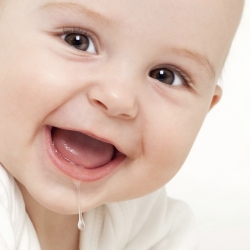 Like other bodily fluids (snot, vaginal fluids, and semen), saliva is not something we talk or think about very often. This clear, watery liquid comes from several glands in your mouth which secrete two to four pints of spit every day.
Like other bodily fluids (snot, vaginal fluids, and semen), saliva is not something we talk or think about very often. This clear, watery liquid comes from several glands in your mouth which secrete two to four pints of spit every day.
In Living in the Tao, Mantak Chia salutes the power of saliva in his tradition: "The Taoists always recommend you swallow your own saliva at least 15 to 30 times a day. This allows the body to heal itself. The saliva itself has a high potassium content, which really heals the body. When you were young and hurt yourself, what was the first thing your mother did? She kissed it and made it all better. The kissing transferred the saliva from her mouth, which had a healing effect on the body. This is the same for animals: as soon as they cut themselves, the first thing they do is lick the cut and that helps the body heal itself. The saliva from the tongue as they lick the wound starts to heal the wound."
In some cultures, expectoration or the spitting of saliva is socially acceptable, and spittoons are available in public places. In her entertaining and enlightening book Gulp, Mary Roach quotes Evi Numen: "For saliva-positive attitudes, there is no place like Greece. Greeks spit on pretty much anything they want to protect from the evil eye or bless for good luck." So don't get bent out of shape when you see a person spitting on a baby or a bride. According to legend, the Greeks picked up this habit from Catholic priests who used to baptize with spittle.
But in other parts of the world, including most other Western cultures, spitting is considered rude. It may even be forbidden by law where it is thought to be a way that disease spreads.
If you regularly use medicines which are known to affect saliva flow, you will give up spitting altogether in order to preserve your great ally. Dry mouth is a nasty condition that is common in older adults and means that your sense of taste is weak and your risk for cavities and gum disease are higher. If you've ever experienced this dreadful affliction, you will be grateful for every drop of saliva you can produce. It truly is a wonder!
